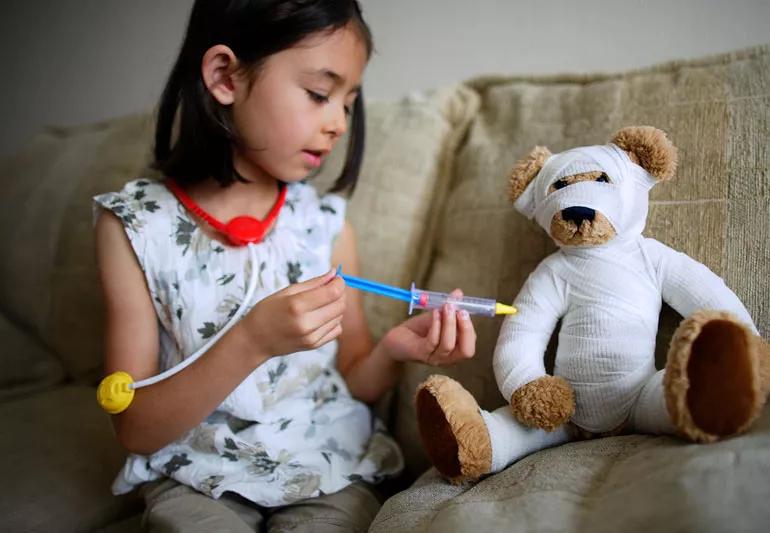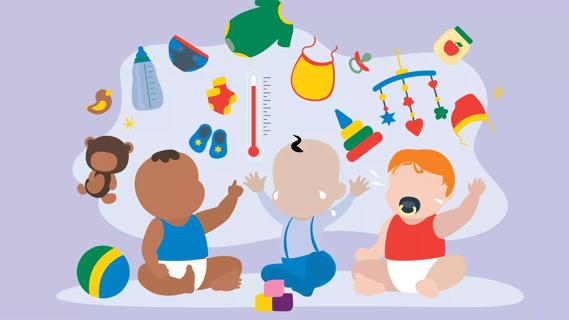Advertisement
Is It OK to Have an Imaginary Friend?
Learn how to handle your child’s make-believe pals

Parents want their children to have good friends. But what if that friend exists only in your child’s mind?
Advertisement
Cleveland Clinic is a non-profit academic medical center. Advertising on our site helps support our mission. We do not endorse non-Cleveland Clinic products or services. Policy
Clinical psychologist Kate Eshleman, PsyD, cares for children and adolescents. She has some reassuring news about imaginary friends — and what you should do if your child has conjured up a companion.
Is it normal for kids to have imaginary friends?
As a child, having an imaginary friend is normal. And not having an imaginary friend? Also normal. “A little over half of all children have an imaginary friend or playmate at some point,” says Dr. Eshleman. “But if they don’t have one, that’s fine too. It depends on the child.”
You might assume that only very young children have imaginary friends, but research has shown that older kids have imaginary pals, too. “It’s common with children up to age 12,” says Dr. Eshleman.
Imaginary friends can be figments of your child’s imagination. Or the friend might be a stuffed animal or toy that they role-play with. Either way, it’s a normal part of childhood for many kids.
Is an imaginary friend a sign of stress or loneliness?
Little Emma talks to her stuffed bear regularly. Does that mean she’s feeling stressed or alone?
Dr. Eshleman says not to worry. “Children might use an imaginary friend to replay or work through things they experience in life,” she explains. “It’s a way to help them practice social skills and process things they see. It doesn’t mean anything is wrong with your child.”
How parents can respond to their child’s imaginary friend
It might feel awkward when your child discusses their imaginary friend with you. But Dr. Eshleman says it’s good for parents to play along.
“Treat your child’s imaginary friend like any other friend,” advises Dr. Eshleman. “Ask your child what their friend’s name is. Or talk to them about what they did with their friend today.”
Maybe your child wants their imaginary friend to have a place at the dinner table. This is OK, too, but you don’t have to take it to extremes. “Don’t give the imaginary friend the last portion of food that someone else would eat,” Dr. Eshleman says. “But if it’s not hurting anyone else, it’s perfectly fine to allow their friend to have a place at dinner.”
When to see your pediatrician
If your child is especially creative, their interactions with their imaginary friend can be quite convincing. How can you be sure your child still understands reality?
“The evidence suggests that kids know their imaginary friends aren’t real,” Dr. Eshleman says. “They may talk about them as if they’re real, but they’re aware that it’s make-believe.”
But to be safe, talk to your pediatrician if your child:
- Seems afraid of their imaginary friend.
- Says their imaginary friend is telling them to do unsafe things.
- Has a change in eating or sleeping habits (though this can be a normal part of development).
- Displays any major changes in their attitude or behavior.
- Still has an imaginary friend after age 12.
Advertisement
A quick check-in with your pediatrician can put your mind at ease. “Remember that you’ll see some behavior changes as your child grows, and this is normal,” says Dr. Eshleman. “But if you’re not sure, it never hurts to ask.”
The perks of imaginary friends
If your child has an imaginary friend, you can reap the benefits, too. After all, an imaginary friend is an awesome listener who’s always available to your child.
“When you’re busy with other tasks, your child can chat with their imaginary friend,” says Dr. Eshleman. “It can keep a child occupied, and that helps the parents out, too. And studies have shown that children who have imaginary friends often grow up to be highly creative adults.”
Advertisement
Learn more about our editorial process.
Advertisement
Related Articles

The Teen Mental Health Crisis: How To Help Your Child
American teens are facing unprecedented rates of depression and suicide, but you can be there to support and help them

How To Help Children With Restless Legs Syndrome
Regular exercise, an iron-rich diet, adequate sleep and bedtime routines that include a warm bath or massage may help with your kid’s RLS

Signs Your Teen Is Self-Harming
Unexplained injuries, mood changes and sudden isolation may be signs your child needs help

Nighty-Night: Tips To Get Your Kid To Stay In Bed
A consistent, structured routine, which may include incentives, can help children learn to stay in bed and get the ZZZs they need

Our Safe and Responsible Guide To Co-Parenting
Keeping open lines of communication and working together as a team for your children are key to co-parenting

Is Your Child Old Enough To Run a 5K?
Let your little one’s enthusiasm and motivation fuel their interest in running, but don’t pile on miles too early

Recurrent Strep Throat: What To Do When Strep Comes Back
Change your toothbrush after an infection and always take your full course of antibiotics to help ward off recurrence

How To Keep Your Kids Healthy When They Go to Daycare
You can help strengthen your child’s immune system by focusing on hand washing and staying up-to-date on their vaccines
Trending Topics

Here’s How Many Calories You Naturally Burn in a Day
Your metabolism may torch 1,300 to 2,000 calories daily with no activity

5 Sinus Massage Techniques To Relieve Pressure and Promote Drainage
A gentle touch in all the right places may help drain your sinuses
